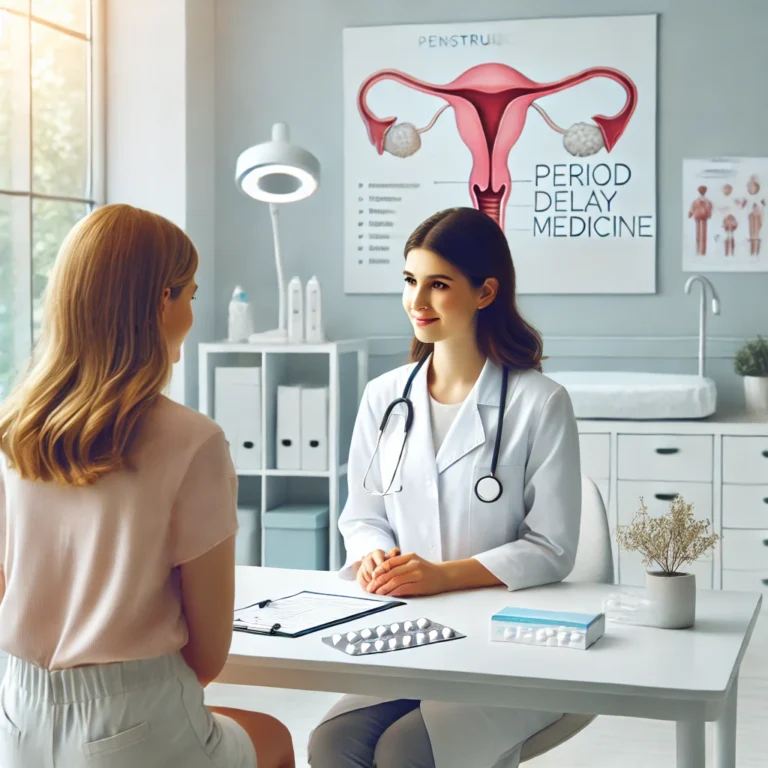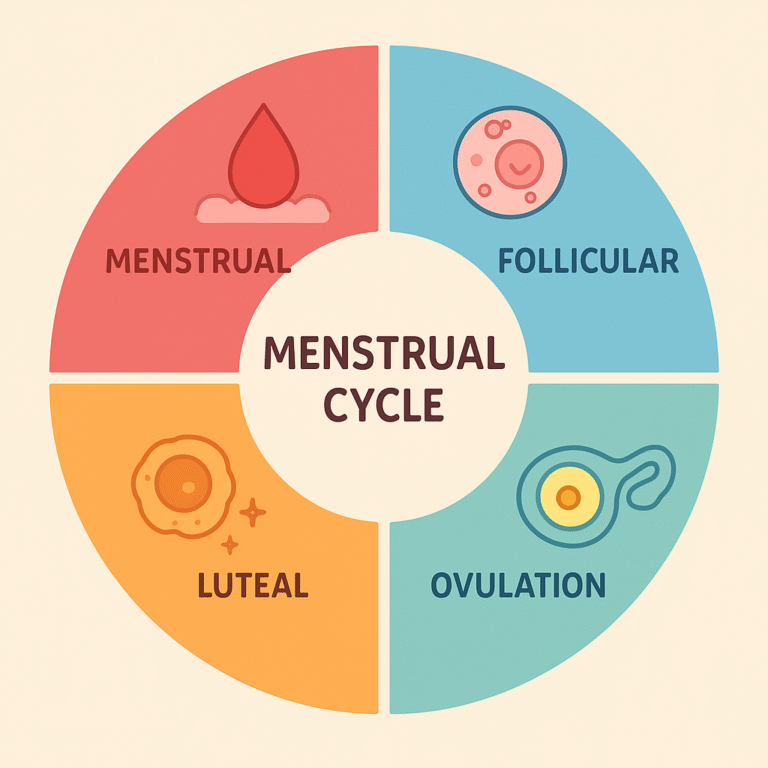What deficiency causes menstrual cramps?
Discover which nutrient gaps commonly make period pain worse — and how simple food, sunshine and small lifestyle changes can ease cramps naturally.
Table of Contents
- Introduction
- Magnesium Deficiency
- Vitamin B Complex
- Vitamin D
- Calcium
- Iron (Anemia)
- Omega-3 Fatty Acids
- How Deficiencies Worsen Pain
- Signs You Might Have a Deficiency
- Foods to Add
- When to See a Doctor
- Conclusion
Introduction
Period pain (dysmenorrhea) ranges from mild discomfort to crippling cramps. Most people blame hormones — and hormones matter — but another big factor is nutrition. If you’re searching for what deficiency causes menstrual cramps, the answer is not a single nutrient but a set of common deficiencies that make cramps worse. This article breaks down each likely deficiency, how it affects your body, and what to eat or do to feel better.
Quick note: this post covers what deficiency causes menstrual cramps in women with otherwise typical menstrual cycles. If your pain is severe or suddenly worse, seek a medical check-up to rule out conditions like endometriosis or fibroids.
Magnesium deficiency
Vitamin B complex (B1 & B6)
When people ask what deficiency causes menstrual cramps related to mood, nerve sensitivity and pain perception, Vitamin B1 (thiamine) and B6 are top answers. These vitamins support nerve health and hormone metabolizing pathways. Small trials show relief from cramps with B1 supplementation and improved mood and PMS control with B6. Add lentils, whole grains, bananas and fortified cereals to boost intake.
Vitamin D deficiency

Low Vitamin D is linked to more severe menstrual pain. Because Vitamin D reduces inflammation and helps calcium do its job in muscles, deficiency is a common culprit when people wonder what deficiency causes menstrual cramps and widespread body aches. Solutions include safe sun exposure, fatty fish like salmon, fortified milk, or a doctor-recommended supplement if levels are low.
Calcium deficiency
Calcium plays a role in muscle contraction control. When paired with magnesium, it helps muscles contract and relax in a balanced way. Inadequate calcium can contribute to strong uterine spasms, making it another important answer to what deficiency causes menstrual cramps. Eat yogurt, cheese, fortified plant milks, tofu and broccoli to support healthy calcium levels.
Iron deficiency (anemia)
Iron deficiency itself doesn’t directly cause cramps, but it worsens how you experience them. Low iron reduces energy and raises fatigue, which makes pain harder to manage. If you have heavy bleeding, iron loss may be significant — so iron status is relevant when asking what deficiency causes menstrual cramps to feel worse. Boost iron with red meat (if you eat it), lentils, spinach and beets. Pair iron foods with vitamin C to improve absorption.
Omega-3 fatty acid deficiency

Omega-3s are anti-inflammatory and can lower the prostaglandins that trigger uterine contractions. If you’re low in omega-3, you may experience more inflammation and stronger cramps — making omega-3 deficiency another answer to what deficiency causes menstrual cramps. Include fatty fish, flaxseeds, chia and walnuts in your diet, or consider an omega-3 supplement after discussing with your healthcare provider.
How deficiencies worsen period pain
In short, deficiencies affect three things that determine how strong cramps feel:
- Muscle function: low magnesium or calcium disrupts contraction/relaxation balance.
- Inflammation: low Vitamin D or omega-3s allow more inflammatory prostaglandins.
- Energy & mood: iron and B-vitamin shortages increase fatigue and pain sensitivity.
Addressing those nutrient gaps often reduces cramp severity without heavy reliance on painkillers — which is why many women ask what deficiency causes menstrual cramps as a first step.
Signs you might have a deficiency
Watch for overlapping signals: muscle cramps or twitches (magnesium), constant tiredness (iron), bone aches or low mood (Vitamin D), and brittle nails (calcium). If multiple signs are present, consult your doctor for tests. Knowing what deficiency causes menstrual cramps for you often starts with basic blood work.
Foods to add to reduce cramps naturally
- Magnesium: spinach, pumpkin seeds, almonds, dark chocolate.
- B-vitamins: lentils, eggs, whole grains, bananas.
- Vitamin D: salmon, fortified milk, sensible sunlight.
- Calcium: yogurt, cheese, tofu, leafy greens.
- Iron: red meat, beans, spinach (pair with vitamin C).
- Omega-3s: flaxseed, chia, walnuts, salmon.
A nutrient-dense, balanced diet directly tackles what deficiency causes menstrual cramps by repairing the underlying imbalances rather than only blocking pain signals.
When to see a doctor
If cramps are keeping you from normal activities, not responding to dietary changes, or suddenly worsen, see a gynecologist. Conditions like endometriosis, adenomyosis or fibroids may be responsible. Also ask your provider to check nutrient levels if you suspect deficiencies — finding out what deficiency causes menstrual cramps for you is often done with a simple blood test.
Conclusion
If you’re asking what deficiency causes menstrual cramps, the short answer is: multiple deficiencies — especially magnesium, Vitamin B complex, Vitamin D, calcium, iron and omega-3s — can make cramps worse. The good news: many of these are easy to address through food, sensible sun, and targeted supplements when needed.
Start with small changes: add magnesium and omega-3 foods, check your Vitamin D and iron if you’re tired or have heavy bleeding, and speak to your doctor about testing. Nutritional adjustments often lead to meaningful relief — and better overall health.
Frequently Asked Questions
1. What deficiency most commonly causes menstrual cramps?
Magnesium deficiency is one of the most common contributors. Low magnesium makes uterine muscles contract more strongly, increasing period pain. Other nutrients like vitamin D, calcium, iron and B vitamins also play a role.
2. Can changing my diet reduce menstrual cramps?
Yes. Eating magnesium-rich foods (spinach, nuts), omega-3 sources (salmon, flax), calcium-rich dairy or alternatives, and iron-containing foods can help address nutrient gaps that worsen cramps.
3. Should I get tested to find out what deficiency causes menstrual cramps for me?
If your cramps are severe, persistent, or accompanied by fatigue or heavy bleeding, ask your doctor for blood tests (iron, vitamin D, basic metabolic panel). Testing helps identify which deficiencies to treat.
4. Can supplements help with period pain?
Supplements like magnesium, vitamin D, omega-3s and iron (only if deficient) can reduce cramps for many women. Always consult a healthcare provider before starting supplements to confirm dose and safety.
5. When should I see a doctor about my menstrual cramps?
See a gynecologist if cramps stop you from daily life, if pain suddenly worsens, or if you have heavy bleeding or other worrying symptoms. A doctor can test for deficiencies and check for conditions like endometriosis or fibroids.
For more natural strategies, see our related post: 10 Natural Menstrual Cramp Remedies Backed by Science.
📲 Connect with Bloomandflowhealth




Your website helps me a lot
Your website helps me a lot